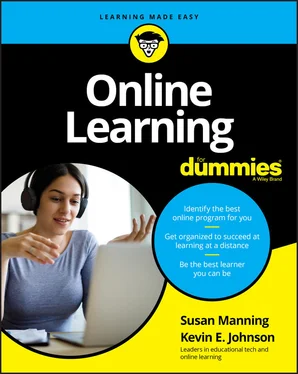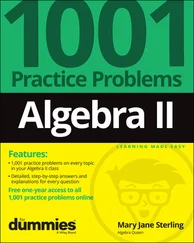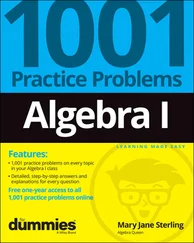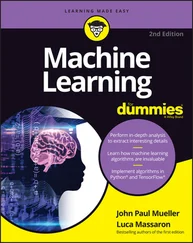Traditional college students
According to a report from 2018 entitled “Grade Increase: Tracking Distance Education in the United States,” the Babson Survey Research Group — along with their partners the Sloan Consortium, Pearson, and Tyton — determined that more than 80 percent of the people enrolled in online courses in 2017 were undergraduate students. You can probably figure that means a sizable number are in the traditional 18-to-24-year-old age group. There are some real advantages to studying online for students of this age.
A slight variation in online learning is called blended, hybrid, or web-enhanced coursework. That means some of your resources and activities are shifted from the traditional classroom to the online environment. For example:
You might be expected to review a presentation online before coming to the traditional class.
You might take all your quizzes online rather than in the classroom.
You might be asked to participate in an online discussion between class meetings.
In some cases, faculty who teach blended courses eliminate one of the class meeting times. For example, if your class meets on Mondays, Wednesdays, and Fridays, your instructor may have you meet only on Mondays and Wednesdays in the face-to-face environment and transfer the Friday materials online. For a traditional-age student, that means having a few additional hours available for other activities.
How would you like to finish school early and put that shiny, new degree to work sooner? If you have time in your schedule and can accommodate a credit overload, you may find that taking an extra online course can help you speed through your academic program. Or, you can use summertime to catch up online.
Consider the example of Allison. Each summer, she came home to her parents’ house for the summer and worked as a lifeguard at a nearby camp. However, she also enrolled in six credit hours through her university. She was not a full-time student, but the extra work did require a little discipline. After three summers, she had shaved off nearly a complete year of college!
 Before you try taking summer courses from a different school, be sure to verify whether the credits transfer.
Before you try taking summer courses from a different school, be sure to verify whether the credits transfer.
If you’re a classic college student (unmarried and without children), not all of your time is spent studying. You may have a job, or you may be involved in campus activities that take up a considerable amount of time. We don’t address what you do with your social time, but it’s a significant factor in the lives of most 18-to-24-year-olds.
Not many traditional-age college students like waking up for an 8 A.m. class. If you study online, you can establish a schedule that works best for you. That means you can sleep in if you need to. As long as you manage your time effectively, it’s possible to be a student online and have a social life (and maybe a job!).
Senior citizens and retirees enjoy active lifestyles these days. That includes using the Internet. Don’t let granny fool you: As the Pew Research group reports, technology adoption among seniors has never been higher. Some seniors are taking online courses for personal enjoyment or to “retool” for careers after retirement.
Seniors benefit from online education for the same reasons everyone else does (see the previous sections for examples), but convenience and not having to deal with transportation issues rise to the top. In addition, seniors have an advantage over most others in that they seem to be better at managing their time.
For young retirees, online learning could provide an avenue to retrain for a new career. In particular, military personnel who find themselves looking for work in their 40s can begin to prepare for their future without having to leave base. For example, First Sergeant Earl earned a special endorsement for teaching while stationed in South Korea; the university was in the United States. After he was discharged and returned to the States, he had the credentials he needed for a successful job search.
Teachers, especially college faculty, like to retrofit themselves for teaching through retirement as well. By enrolling in online courses, retiring faculty can update skills and acquire new understandings of the teaching and learning processes so that they’re more marketable as part-timers or adjuncts. A retiree can still travel and teach (with a stable Internet connection, of course).
High school and homeschooled students
Perhaps the hottest area of growth and development in online learning impacts high school and homeschooled students. We address this topic in Chapter 18, but we review the basics here, in particular, the benefits of online learning for kids.
Even before COVID-19 made its first appearance, school districts offered online options for their students. In 2017, nearly 60% of public schools offered at least one online course. (These numbers come from the National Center for Educational Statistics.) In today’s digital age, learning online has these distinct benefits for young students:
It advances kids’ technology skills. Consider that most white collar jobs now require technology skills. With the globalization of business and industry, collaborating with colleagues around the world is common for knowledge workers. Children who acquire computer-mediated communication skills already understand how to collaborate online. Online learning teaches 21st century skills.
It helps homeschooling parents plan their curricula. In North America, homeschooling is inconsistently regulated. Having a quality source for instruction allows parents to select and supervise the curricula. Though state-supported schools still meet state mandates, parents can determine the most appropriate courses for their children.
It allows kids to work at their own pace. Virtual schools for kindergarten through 12th grade are more likely to be self-paced with parental supervision. In other words, if your child is gifted and can finish algebra in eight weeks, they can move on to their next course without waiting. If your child needs more time, that can be accommodated as well.
It facilitates the management of health issues. For kids with medical needs or disabilities, online education allows the family to manage health concerns without disrupting learning. For example, a child with severe diabetes can monitor blood sugar levels by snacking while learning. In a traditional classroom, the child would probably have to go elsewhere to snack, resulting in lost instructional time.
It offers greater scheduling flexibility. Reducing the time children spend in school increases time for other activities. In some cases, teens work significant internships, acquiring additional skills that complement their online education. For kids who excel in the arts or athletics and need additional time for practice, online education fits their lifestyles. Not only can they schedule learning before and after workouts and rehearsals, but also schooling doesn’t stop because of travel to performances and events.
It fills specialized needs that traditional high schools can’t. One high school can offer only so many classes, particularly in rural areas. The availability and expertise of teachers and school district financial constraints sometimes determine what courses students take. For students looking for more variety, online education can serve it up. Students aren’t limited to what’s available at their own school, but can tap into a wide network of available courses. They may find many of these courses at a state-supported virtual school, which directly ties into graduation requirements because those courses and programs follow the same state mandates.Advanced placement (AP) courses allow high school students to study more challenging subject matter at a higher level than traditional high school courses. Additionally, these courses often count for college credit. Virtual high schools put AP courses within reach of those whose schools don’t offer them. Even students who don’t study entirely online can have access to the kinds of classes they want and need through these online programs. Of course, buyer beware: Check with your local district to be sure they’ll accept the online credits.
Читать дальше

 Before you try taking summer courses from a different school, be sure to verify whether the credits transfer.
Before you try taking summer courses from a different school, be sure to verify whether the credits transfer.










